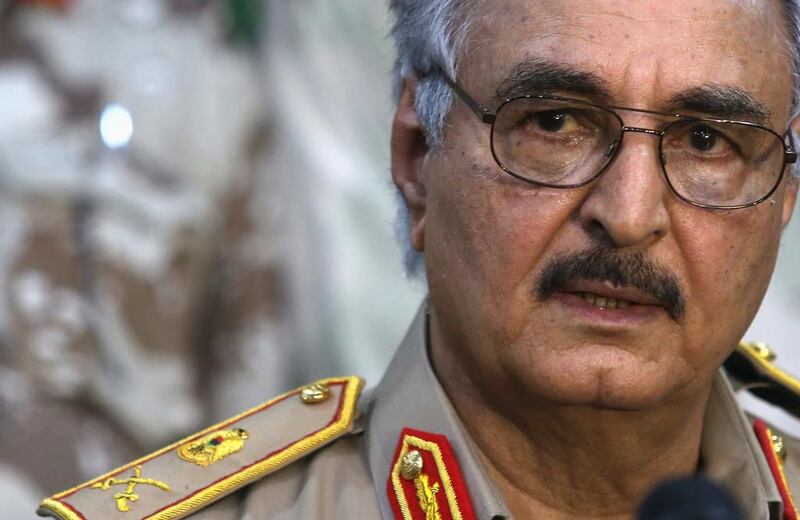BAYDA, LIBYA // In a hotel lit by a generator in the eastern Libyan town of Bayda, economy minister Munir Ali Asr outlines optimistic plans to attract investment to a country ravaged by war and political chaos.
Outside, Bayda lies in darkness after another power cut. Hundreds of residents wait outside petrol stations that have closed as a debilitating power struggle between two rival governments continues to wreck basic services.
Growing frustration over the reality of life in eastern Libya, which contrasts with the promises of politicians, is feeding support for a former army general, Khalifa Haftar, who has set himself up as a warrior against militancy and who some also see as their saviour.
The internationally recognised prime minister Abdullah Al Thani and his government sit in Bayda, while a rival faction Libya Dawn set up its own government in Tripoli after taking over the capital last summer.
“I am tired of politicians just talking and talking,” said Raed, an oil service manager who was demonstrating in front of Mr Al Thani’s office. “Thani is too weak to end this mess. We need a military council headed by Haftar.”
Gen Haftar is styling himself as a would-be leader in the east.
While his fighters have won back some territory from militia in Benghazi, he is proving a divisive figure among those in Mr Al Thani’s government.
Critics say Gen Haftar sees himself as Libya’s version of Egyptian president Abdel Fattah El Sisi, a former military man.
“Haftar wants to dominate. But if you want to build a state nobody should be above accountability,” said a minister in Mr Al Thani’s cabinet.
Gen Haftar tends to pop up whenever there is upheaval in Libya. He helped Muammar Qaddafi to power in 1969 but fell out with him after a disastrous defeat suffered by troops he was commanding during Libya’s war with Chad in the 1980s.
He lived in the US until he joined the uprising against Qaddafi in 2011.
Officials in Bayda struggle to explain their relationship with Gen Haftar. They need his forces but prefer not to talk about it.
Lawmakers have several times confirmed and then denied the existence of a decree signed by the parliamentary speaker recalling Gen Haftar to official duty.
In an apparent power play, Gen Haftar’s forces tried to stop Mr Al Thani from visiting Benghazi. Mr Al Thani is in a weak position, even in his seat at Bayda. It is packed with people who have fled Tripoli complaining of threats or attacks from Libya Dawn.
“The situation not stable,” said a soldier at a checkpoint near Mr Al Thani’s office. Some 50 protesters have showed up several times to demand his resignation. “I don’t like Haftar. But only he as a military man, and a military council, can save Libya,” said a protester who gave his name as Abdelaziz.
A Libyan entrepreneur dismissed the protesters as “thugs paid by the new Qaddafi, Haftar”.
Having no ministries, Mr Al Thani’s team work out of hotels or rented villas. When asked how basic services will be restored, economy minister Mr Asr acknowledged difficulties but said Libya had a bright future as an investment destination and trade gateway for Africa.
“There is no need to be worried about Libya’s economy,” he said.
* Reuters





